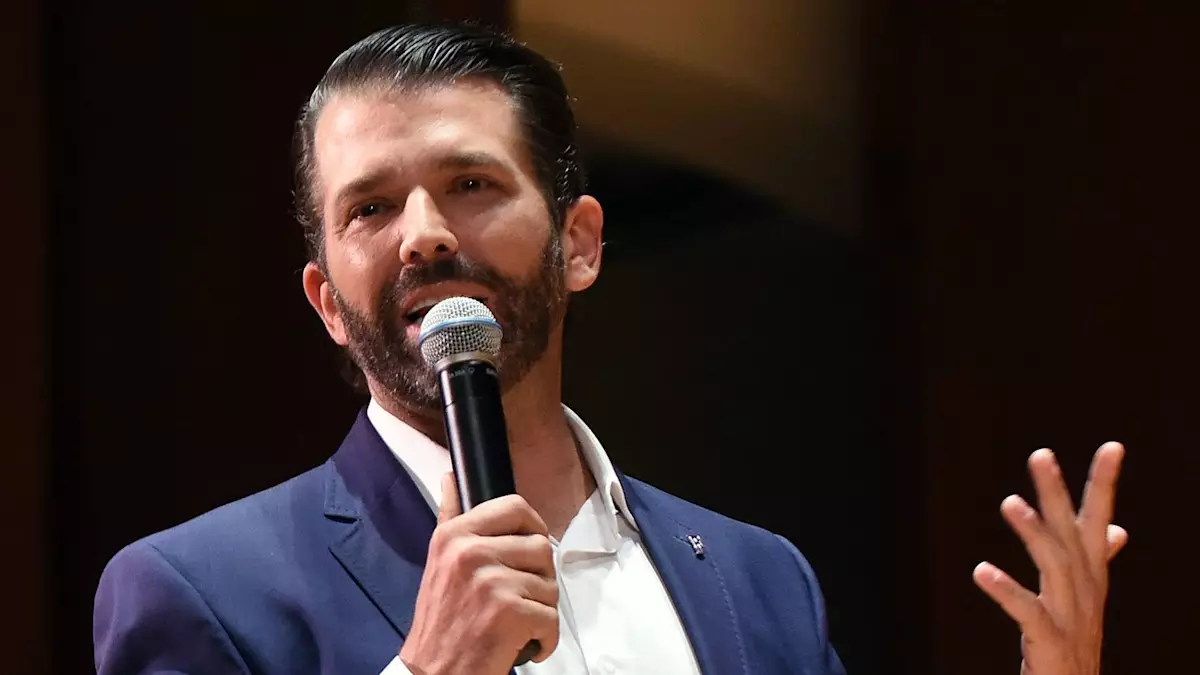In a political landscape often marred by divisive rhetoric, reactions to personal tragedies can be telling reflections of character. The recent announcement of President Joe Biden’s aggressive prostate cancer diagnosis unleashed a torrent of reactions, none more controversial than that of Donald Trump Jr. This unearthed a facet of political discourse that, while intended as satire, often crosses the line into tackiness and insensitivity. Trump Jr.’s sarcastic probe into how Dr. Jill Biden, a renowned educator with a PhD, could overlook a diagnosis as serious as stage five metastatic cancer certainly missed the mark and ignited outrage on social media platforms.
The former president’s eldest son leveraged X, the platform formerly known as Twitter, to suggest a conspiracy surrounding the gravity of Biden’s health. Many interpreted his remarks not as mere sarcasm but as a blatant disregard for the seriousness of a health crisis. The ensuing backlash highlighted much more than the inappropriate nature of his comment; it brought forth discussions on the boundaries of humor and respect in public discourse, especially within the realm of politics.
The Double-Edged Sword of Sarcasm
The day following his initial comment, Trump Jr. defended his position by branding it as “sarcasm,” a claim that was met with skepticism and derision. The invocation of sarcasm often serves as a shield for those attempting to evade accountability for their words. It is a common tactic employed by public figures when confronted with criticism, yet the effectiveness of this defense hinges on the audience’s interpretation.
Critics quickly pointed out that sarcasm, especially in the context of someone’s health condition, is a dangerous path to tread. When a public figure publicly ridicules another for their perceived shortcomings — in this case, a doctor’s credibility — the commentary risks appearing disingenuous. Social media users quickly countered Trump Jr.’s assertions, emphasizing the insensitivity of his insinuations. The exchange became emblematic of a more significant commentary on how political dynasties often misjudge the pulse of public sentiment, mistaking caustic cynicism for wit.
The Irony in Critique
The irony of Donald Trump Jr. questioning another’s qualifications while benefiting from inherited wealth and privilege underscored the disingenuousness of his stance. Many social media commentators seized upon this irony, suggesting it warranted its own ridicule rather than serious debate. This dissonance within the Trump dynasty’s claims drew attention to a broader issue: the hypocrisy present in critiques of others’ credentials, especially when your own success is predicated on familial legacy rather than personal merit.
Political discourse has increasingly become a reflection of tribe versus tribe, where personal attacks overshadow meaningful dialogue. Instead of addressing the ramifications of Biden’s health, Trump Jr. pivoted to his usual antagonistic tactics, further alienating potential supporters who might have preferred a more empathetic response.
Addressing the Human Element
Beyond the political theater, President Biden’s quiet and respectful message regarding his diagnosis was a stark contrast to the cacophony of sarcasm and ridicule offered by Trump Jr. Biden’s acknowledgment of his condition as a shared human experience, coupled with a call for support and strength, stood in sharp relief to the bitterness displayed by some members of the opposing party. In contrast to the vicious cycle of mocking others’ misfortunes, this moment humanized the struggle that many endure, drawing attention to the collective fight against cancer, a battle that afflicts countless families.
In an era where empathy can often seem in short supply in political rhetoric, Biden’s heartfelt approach reinforces the importance of human connection, even when political affiliations diverge. Each diagnosis, each challenge faced, becomes an opportunity for solidarity — an ideal often overlooked in the fervor of partisan bickering.
As political discourse continues to occupy a space where personal attacks frequently eclipse genuine dialogue, it becomes essential for public figures to recognize the weight of their words. Sarcasm, especially at the expense of someone’s health, often reflects not just a failure of empathy but a deeper misunderstanding of the responsibilities that accompany public life. In an extraordinary time where unity and compassion are paramount, perhaps the call for deeper respect and a shift in discourse is what we need more than ever.

